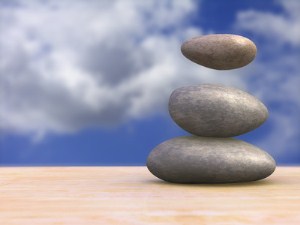What is yoga and why do it?
It is
a common misconception that people need to be young and flexible to
practice. In fact, the older and less flexible you are, the more you have to gain!
Yoga is an ancient form of meditation, and is arguably the most powerful system of overall health and wellbeing ever invented.
It is not a religion, and is practised equally by people of varying faiths, and by those of no religious beliefs.
As Dr Timothy McCall writes in his book, Yoga As Medicine, "as preventitive medicine, yoga is as close to one-stop shopping as you can find."
A yoga practice combines physical postures (asanas) with breathing and meditation techniques. The result is a powerful all-round practice that works to restore health, balance, perspective and vitality.
Yoga is an ancient form of meditation, and is arguably the most powerful system of overall health and wellbeing ever invented.
It is not a religion, and is practised equally by people of varying faiths, and by those of no religious beliefs.
As Dr Timothy McCall writes in his book, Yoga As Medicine, "as preventitive medicine, yoga is as close to one-stop shopping as you can find."
A yoga practice combines physical postures (asanas) with breathing and meditation techniques. The result is a powerful all-round practice that works to restore health, balance, perspective and vitality.
Yoga's physical & psychological benefits include:
stress reduction
all-round toning
increased flexibiltiy
improved balance
greater overall strength and stronger bones
joint health
heightened cardiovascular conditioning
lower blood pressure
reduced weight
elevation of mood
greater psychological equanimity
relief from insomnia
prevention of arthritis and osteoporosis
relief from depression and anxiety
improvement in symptoms of chronic fatigue
For more on yoga, and for general lifestyle tips on wellbeing, see our online yoga magazine, Yoga Abode (www.yoga-abode.com).
It is sometimes said that 'if you can breathe, you can do yoga'. Yoga
can be practised by everyone, regardless of age, religion or state of
health.
In short, the physical aspect of yoga - the postures, or asanas - are a small part of the practice.
Other aspects include breathing, relaxation and meditation - which can be practised by anyone.
An appropriate yoga/meditation routine can be especially beneficial to those who are very ill; less mobile; or confined to their homes (or to their beds).
This may include those suffering from Chronic Fatigue Syndrome, cancer, MS and Parkinsons. Please follow this link for an article on yoga for cancer sufferers.
Those suffering from mental health issues such as anxiety, stress of depression, may also find yoga and/or meditation very beneficial.
Modern science has recently found that a regular (as little as 20 minutes a day) practice can lead to a change in how the brain works - allowing it to forge healthier patterns of behaviour and reaction (known as 'neuro-plasticity').
Classes for people with challenging physical and/or psychological conditions are ideally arranged on a one-to-one basis.
However, one of my small group classes may well be approprate - please click here for more info.
In short, the physical aspect of yoga - the postures, or asanas - are a small part of the practice.
Other aspects include breathing, relaxation and meditation - which can be practised by anyone.
An appropriate yoga/meditation routine can be especially beneficial to those who are very ill; less mobile; or confined to their homes (or to their beds).
This may include those suffering from Chronic Fatigue Syndrome, cancer, MS and Parkinsons. Please follow this link for an article on yoga for cancer sufferers.
Those suffering from mental health issues such as anxiety, stress of depression, may also find yoga and/or meditation very beneficial.
Modern science has recently found that a regular (as little as 20 minutes a day) practice can lead to a change in how the brain works - allowing it to forge healthier patterns of behaviour and reaction (known as 'neuro-plasticity').
Classes for people with challenging physical and/or psychological conditions are ideally arranged on a one-to-one basis.
However, one of my small group classes may well be approprate - please click here for more info.
